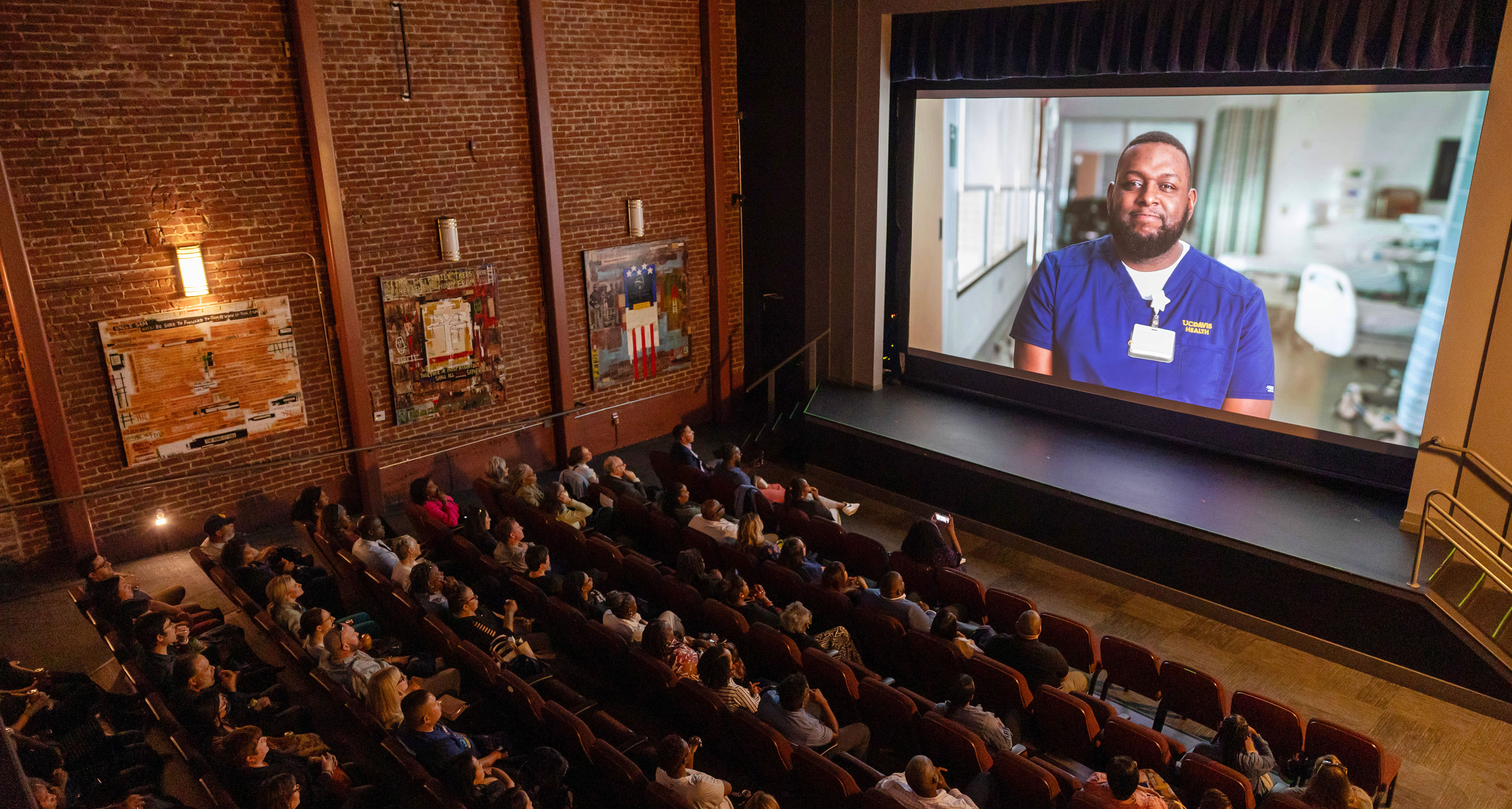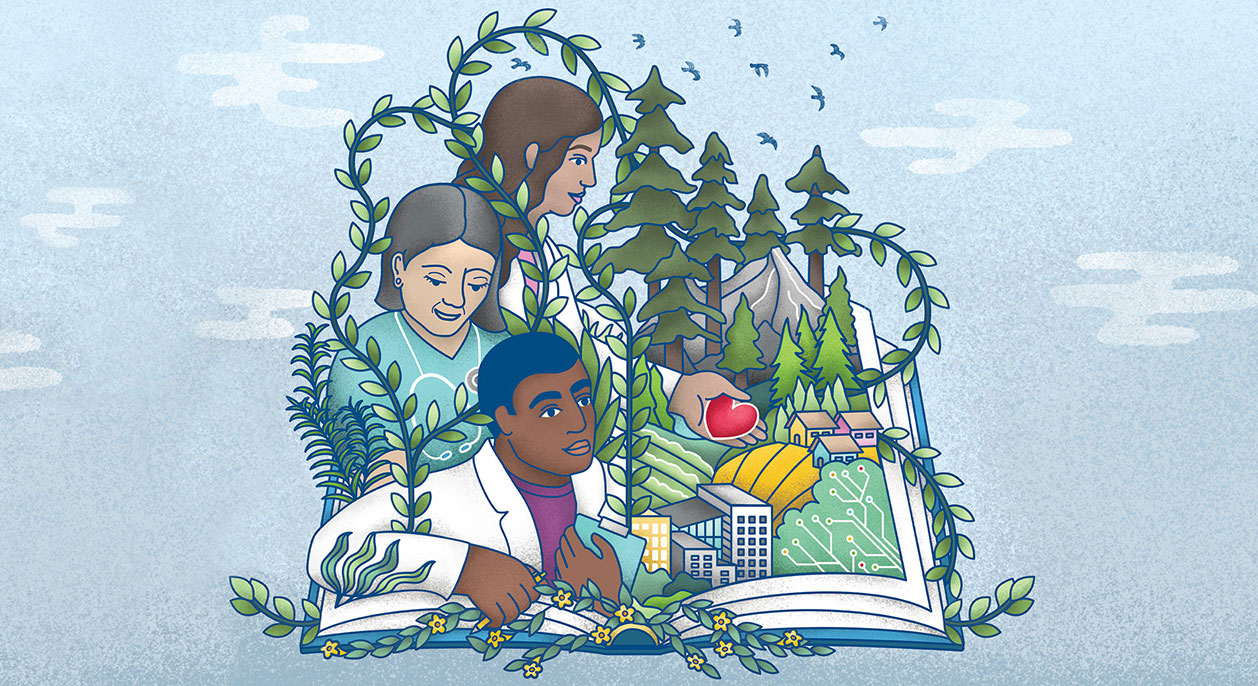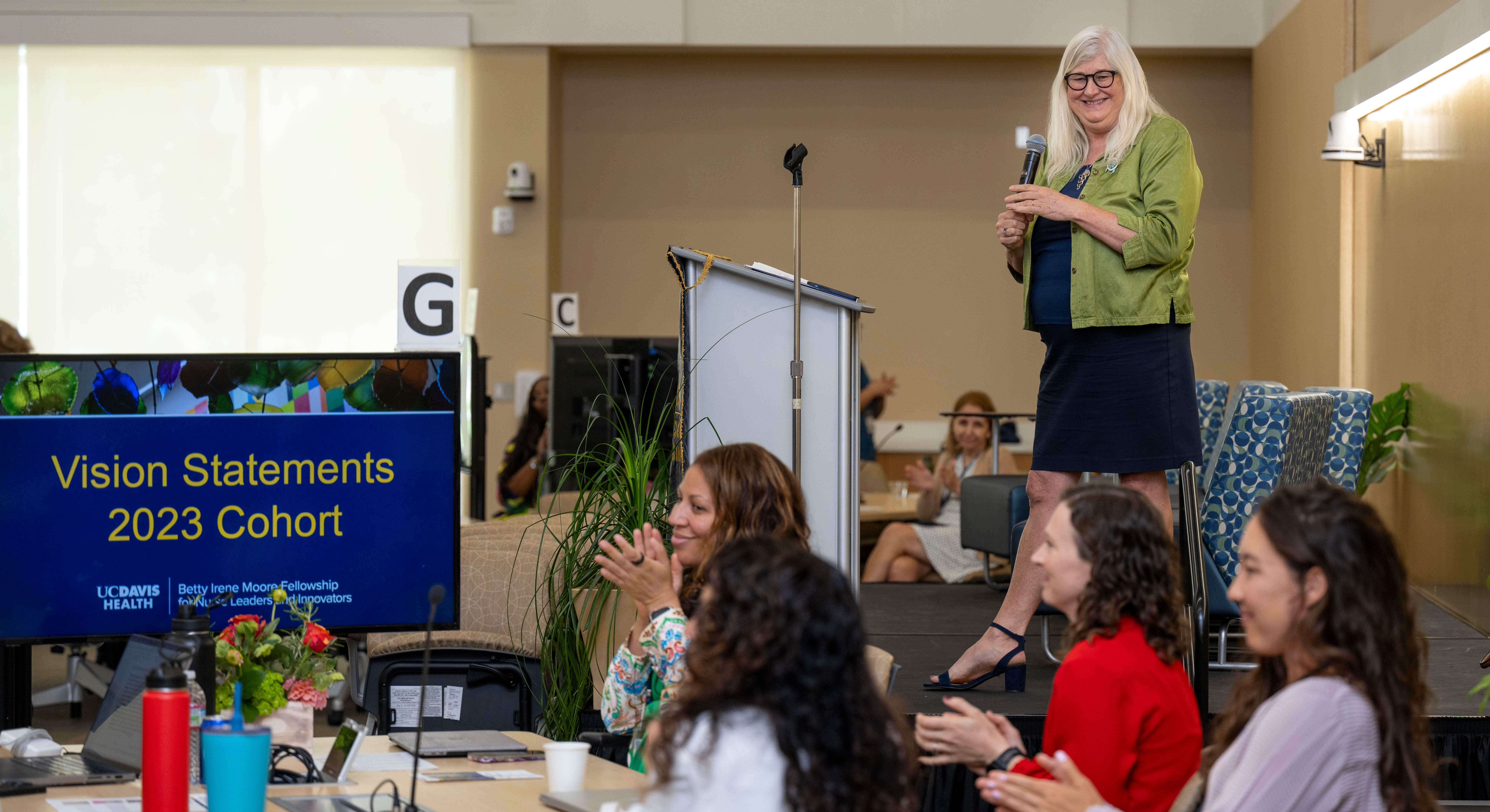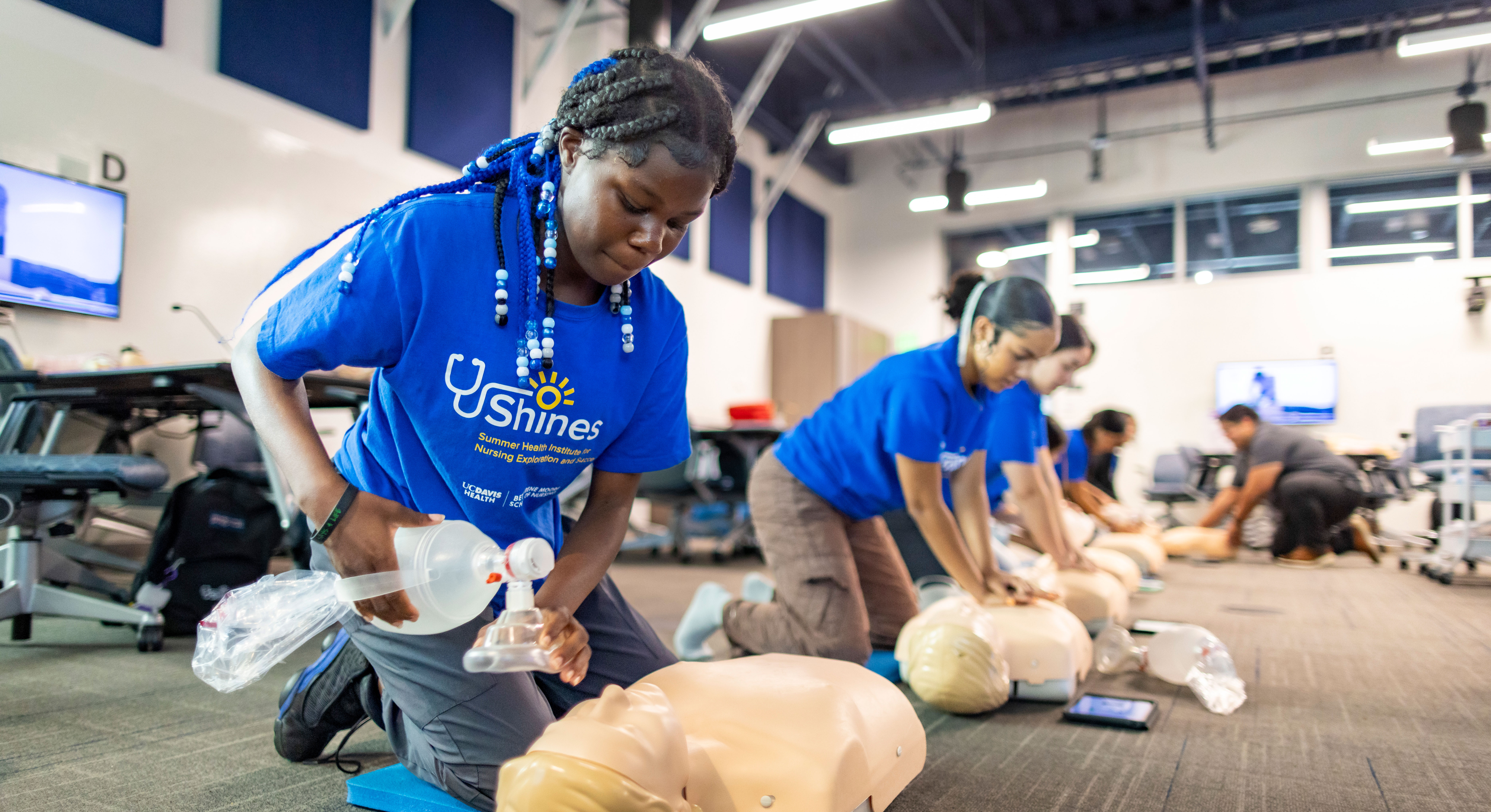Rejecting structural racism is everybody’s work. That’s the perspective of a 2024 documentary exploring racism in the health care industry and, especially, through the lens of its largest workforce — nurses.
“Everybody’s Work: Healing what hurts us all” was first screened in May in Washington D.C., then premiered in Sacramento in August. It reveals racism’s harmful effects on patients and nurses alike. The film was funded by the Robert Wood Johnson Foundation (RWJF), one of the nation’s largest health care foundations.
The filmmakers chose to focus on the Betty Irene Moore School of Nursing at UC Davis and UC Davis Health because of their national reputation for advancing diversity, equity and inclusion (DEI) through nursing education and employment.
“The Betty Irene Moore School of Nursing and UC Davis Health are nationally recognized for their tangible efforts and financial investments to equip the teaching and clinical workforce to deliver equitable care,” said Jann Murray-García, professor emeritus at the School of Nursing. “These programs take strong leadership at the highest levels of the school. The film also highlights the unique work of our diverse set of alumni who continue to serve our institutional and regional community.”
Murray-García, a physician, has spent her career as a social activist promoting cultural humility, combatting social inequities and teaching on the social determinants of health. These determinants are the non-medical factors that affect one’s health, such as economic stability, access to quality education and neighborhood environment.
In the film she discusses narratives that persist in education and health care today. What she calls “scripts” are stories that perpetrate biased views and subconscious and conscious actions toward people of color. She, along with nurses, students, alumni and faculty, illustrate what’s being done to dismantle barriers to health equity and combat racial bias.
School of Nursing faculty, along with some featured in the film, joined at the Guild Theater in Sacramento’s Oak Park neighborhood on Aug. 22 for the local premiere of the film. Numbering nearly 200, faculty, alumni, students and community nursing organizations packed into the Guild Theater in the Oak Park neighborhood to watch the film and hear from those featured in it.
“Nurses work on the frontlines in combating the daily inequities of care delivery,” said Piri Ackerman-Barger, associate dean for Student Affairs and Health Equity, Diversity and Inclusion, who was the screening emcee for the evening.
Pandemic sparks a movement
In 2020, the COVID-19 pandemic and the murder of George Floyd painted a picture of the inequities that exist in health care. Out of those experiences grew the National Commission to Address Racism in Nursing. It’s a joint project by the American Nurses Association (ANA), the National Black Nurses Association (NBNA), the National Association of Hispanic Nurses (NAHN) and the National Coalition of Ethnic Minority Nurse Nurses Associations (NCEMNA). Their goal: to explore the issue of racism in nursing across the nation, highlighting its effects on nurses, patients, communities, and health care systems, aiming to inspire all nurses to address both individual and systemic racism.
“Given the disparate outcomes of the COVID-19 pandemic and racial tension in the U.S., there is no better time to discuss health disparities and how to mitigate them,” said Ackerman-Barger. “To advance the work necessary to dismantle systemic racism and improve health inequities we must create equity-minded nurses who are trained to look at marginalized communities and adapt their approach to benefit the patient.”
The United States has more than 4 million registered nurses and nearly 1 million licensed practical and vocational nurses. A 2023 survey by the RWJF examined nurses’ experiences and perceptions of racism and discrimination in both health care settings and nursing schools. It found that nearly 8 in 10 nurses have experienced or seen racism from patients or co-workers.
Personal stories behind the numbers
The United States has more than 4 million registered nurses (RNs) and nearly 1 million licensed practical and vocational nurses. A 2023 survey by the RWJF examined nurses’ experiences and perceptions of racism and discrimination in both health care settings and nursing schools. It found that nearly eight in 10 nurses have experienced or seen racism from patients or co-workers. Based on nursing data and experiences, “Everybody's Work” delves into the intricate issue of structural racism in nursing by focusing on personal narratives. Through the voices of nurses, educators, leaders and advocates nationwide, the documentary sheds light on their efforts amid challenges.
“If we focus on storytelling that embraces shared values, highlight stories where people see reflections of themselves and lead with grace,” explained Chad Tingle, the film’s director, “we can build a broader coalition of anti-racist nurses.”
One of those stories highlights Aron King, an assistant nurse manager at UC Davis Medical Center and second-year Doctor of Philosophy student at the Betty Irene Moore School of Nursing at UC Davis. He is among the 12% of men in nursing and fewer than 1% of Black male nurses in the nation.
“It was super cool knowing that they somehow found the things that I was doing valuable enough to be put in the documentary,” recalled King, who was interviewed for an hour. “It was exciting seeing my colleagues on screen and having my story and perspective shared to a captive audience. As a Black nurse, I have taken a collaborative impact approach to diversifying the nursing workforce. I’m demonstrating what can be done beyond the bedside.”
King attended the film’s premiere in Washington, with Murray-García. In the film, he discussed how it wasn’t he attended the School of Nursing for its master’s-degree leadership program in 2017, that he learned about social determinants of health, how race impacts outcomes and the disparities seen in certain communities.
After sharing it with the local Sacramento community — at the screening and panel discussion following — he said it felt like a homecoming.
“I really wanted to focus on the grassroots origins of CCBNA to show that anyone can do this work. The film highlights the notion that this is really everybody’s work, but I know quite often people are not confident in their own abilities,” he said. “If we are sitting watching this movie thinking, ‘What can I do?’, it really can start with conversations.
Tonja Copeland was drawn to the School of Nursing because of its focus on a diverse student body. Having already been a Licensed Vocational Nurse for 23 years, and her wealth of personal experience, including hardship, made her an even more attractive candidate for the Master’s Entry Program in Nursing, which she completed in December. Now an RN for UC Davis Health, Copeland never imagined she would end up on the big screen. But that’s exactly what happened.
“I tried to be a voice for all generations to never give up your dreams to be a nurse — no matter the challenge — because there is a way. I hope that by taking part in this documentary that I can help pave the way for equal care, equal recognition and proper patient-center care,” explained Copeland.
After the Sacramento event, she was even more inspired to expand the message.
“We have to get the message out that racism hinders health care efforts to meet patients' and their family needs,” she said. “As the film states, "It is Everybody's Work" to heal what is broken. To shed light on what has been hidden.”
Pathways for future students of color
Another highlight of the film is the work being done by School of Nursing alumni through the Capitol City Black Nurses Association. This Sacramento chapter of NBNA was started by alumni and offers its annual “Breaking Down Barriers” conference. In partnership with the Sacramento Chapter of NAHN, the Hmong Nurses Association and the capital city chapter of the Philippine Nurses’ Association of America the two-day pre-nursing event promotes the nursing profession to communities of color.
For the past two summers, the School of Nursing’s Summer Health Institute for Nursing Exploration and Success (SHINES) has allowed Sacramento-area high school students to experience hands-on learning to discover what nursing pathways suit their needs and how to succeed in their academic aspirations.
Organizers believe an increase in diversity in nursing will result in a decrease in disparities in health. “We think the earlier young people see themselves as capable and valuable to the health care profession, the sooner they’ll make the steps to prepare where they need to go to get there,” Ackerman-Barger said.
Continual engagement for patients, students and communities
The film questions the idea that racism only exists if personally encountered. It encourages viewers to understand how racism keeps all people from benefitting from the talents and contributions of those around them.
During the Sacramento event, organizers awarded community leaders who are contributing to that conversation. One of the recipients was Georgia West, affectionately known as Mother Rose, a name given by her son, former Mayor Kevin Johnson. A pillar of the community and longtime manager of Underground Books, otherwise known as the "literary hub of Oak Park." Another awardee that evening was Genoa Barrow, a local reporter in Sacramento focused on health in the community.
“It should go without saying that the several dozen or so faculty, staff and administrators employed specifically to lead equity efforts at UC Davis Health cannot possibly do this work without the meaningful engagement of each one of us,” Murray-García explained after the film. “Everybody who represents our health system must continually engage with our fellow employees in the way we would want to be treated. We must continually provide what each patient or student needs, to the extent we are able, in the way we would treat those most highly prized in our lives.”
“Everybody’s Work” is the second documentary from SHIFT Nursing, an online community for nurses that launched in 2020 with a podcast and has evolved to include a variety of storytelling mediums.






